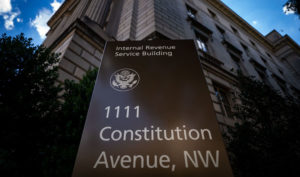
IRS may make temporary healthcare tax credits permanently available to married victims of domestic abuse.
The Internal Revenue Service (IRS) recently proposed a rule to improve access to affordable health coverage under the Patient Protection and Affordable Health Care Act for victims of domestic abuse.
The proposed rule would allow married victims of domestic abuse to file separate tax returns without losing federal healthcare subsidies normally reserved to jointly filing couples. The IRS also issued a temporary regulation allowing domestic abuse victims to take advantage of the benefits immediately.
Under the Patient Protection and Affordable Care Act, known as Obamacare, anyone can purchase government regulated health care plans through a Health Insurance Marketplace. Low-income individuals and families can qualify for federal subsidies that reduce the cost of Marketplace plans. One such subsidy, an advance premium tax credit, can be sent directly to the insurance company to reduce monthly insurance premiums for enrollees, who must repay any excess credits on their next tax return.
Current IRS rules require married taxpayers seeking premium tax credits to file a joint tax return, preventing married taxpayers who file separate returns from claiming the credit. Married taxpayers who receive advanced credits but file separately have to repay the credits. This creates an obstacle for married victims of domestic abuse: they must file jointly with an abusive spouse from whom they may have separated, or forgo the premium tax credit they may need in order to be able to afford health care.
Obamacare includes several provisions that help victims of domestic violence obtain affordable health care coverage. Under Obamacare, uninsured domestic abuse victims may claim a hardship exemption to waive the “individual mandate” fee imposed upon individuals without health coverage; most Marketplace health insurance plans must cover mental health services, which benefit domestic abuse survivors because intimate partner violence has been found to be a major risk factor for depression and suicide; and private health plans must cover domestic and interpersonal violence screening and counseling for adolescent and adult women. Additionally, Obamacare’s ban on denying coverage based on pre-existing conditions prevents discrimination against domestic violence victims, allowing them to enroll in healthcare coverage through the Marketplace. Prior to Obamacare, some states allowed insurers to deny health coverage to domestic violence survivors on the grounds that abuse was a “pre-existing condition.”
Although Obamacare removes many barriers to access to affordable healthcare faced by victims of domestic abuse, abused spouses still face obstacles in claiming premium tax credits due to the joint filing requirement. The IRS recognized this problem when it issued the final rule for the Health Insurance Premium Tax Credit in 2012, and requested public comments about whether an exception to the joint filing requirement should be made in instances of abuse. Specifically, the IRS sought comments about what documentation should be required to establish that a taxpayer cannot file a joint return due to domestic abuse, and what treatment the alleged abusive spouse should be accorded in such situations.
Advocacy groups, such as Planned Parenthood and the National Partnership for Women & Families, submitted comments urging the IRS to minimize the documentation required to claim an exception to the joint filing requirement in situations of domestic abuse and not to share personal information with the other spouse.
Seeking to address these concerns, the IRS issued a temporary regulation in July 2014 allowing married victims of domestic abuse to claim a premium tax credit by filing a separate return indicating that he or she meets this criterion. The temporary regulation took effect immediately and will expire in July 2017. On the same day, the IRS proposed to make this temporary rule permanent. Under the temporary rule, a married taxpayer is exempt from the joint-filing requirement and may file separately if he or she is unable to file a joint return because the taxpayer is a victim of domestic abuse or spousal abandonment. The taxpayer must certify on the tax return that he or she meets this requirement. The temporary rules also limit the exception to three consecutive years.
Following the proposed and temporary rules, in September 2014, the IRS issued draft instructions for Form 8962, the tax form used when applying for a premium tax credit. The draft instructions included a checkbox for taxpayers wishing to invoke an exception to the joint filing requirements due to domestic abuse. The instructions specifically state that documentation is not required, but they advise applicants to keep any such documentation in their personal records.
Comments submitted by public interest organizations after the July proposed rule and September draft instructions urged the IRS to take into account the real-life experience of domestic abuse survivors. They commended the IRS on expanding its definitions of domestic abuse to include “psychological, sexual, and emotional abuse, including efforts to control, isolate, humiliate, intimidate, or undermine the survivor’s ability to reason independently.”
Commenting organizations also applauded the fact that the Form 8962 draft instructions do not require supplemental documentation in order to claim such relief, but they urged the IRS to clarify that no documentation is needed, and that self-attestation of domestic abuse is sufficient to claim an exception to the joint filing requirements. These comments cited concerns about confidentiality that may discourage survivors from claiming the exception, as well as the general difficulty of obtaining documentation in abuse cases.
These comments also raised privacy concerns about the certification requirements, pointing out that tax returns are often used in other contexts and arguing that domestic abuse survivors may face stigma, discrimination, or even retribution from their abusers. Planned Parenthood suggested omitting or redacting the information in the checkbox whenever the tax return is provided to other persons or entities. The National Health Law Program suggested creating a supplemental form for taxpayers claiming a domestic abuse exception.
Additionally, Planned Parenthood and other organizations recommended removing the three-year limit, primarily because of the unpredictable nature of domestic abuse. A victim often attempts to leave an abusive partner several times before leaving permanently, so three years may not be enough time for the abused partner to leave the abusive relationship and obtain a divorce. Economic dependence is one of the main reasons abused spouses return to their partners, meaning a three-year limit may compound the challenges abused spouses face in trying to gain independence from their partners.
The comment period for the proposed rule closed on October 27, 2014. Taxpayers must apply the temporary regulations, which expire in July 2017, until the final rule is published.



